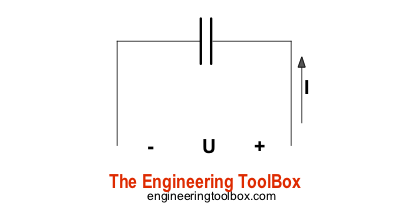Capacitors - Stored Energy
Potential power and energy stored in capacitors.

Capacitor - Energy Stored
The work done in establishing an electric field in a capacitor, and hence the amount of energy stored - can be expressed as
W = 1/2 C U2 (1)
where
W = energy stored - or work done in establishing the electric field (joules, J)
C = capacitance (farad, F, µF)
U = potential difference (voltage, V)
Capacitor - Power Generated
Since power is energy dissipated in time - the potential power generated by a capacitor can be expressed as
P = dW / dt (2)
where
P = potential power (watts, W)
dt = dissipation time (s)
Example - Capacitor, energy stored and power generated
The energy stored in a 10 μF capacitor charged to 230 V can be calculated as
W = 1/2 (10×10-6 F) (230 V)2
= 0.26 J
in theory - if this energy is dissipated within 5 μs the potential power generated can be calculated as
P = (0.26 Joules) / (5×10-6 s)
= 52000 W
= 52 kW
Be aware that in any real circuit, discharge starts at a peak value and declines. The energy dissipated is a very rough average power over the discharge pulse.
Capacitor - Time to Discharge at Constant Power Load
The time to discharge a capacitor at constant power load can be expressed as
dt = 1/2 C (Us 2- Uf2) / P (3)
where
dt = discharge time (s)
Us = start voltage (V)
Uf = final voltage (V)
Breakdown (puncture) Voltage
Puncture voltage at 1 MHz (V/mil, V/0.001 inch):
- Air: 240
- Alsimag: 240
- Bakelite: 300
- Bakelite, mica-filled: 325 - 375
- Cellulose acetate: 250 - 600
- Formica: 450
- Glass, window: 200 - 250
- Glass, Pyrex: 335
- Mica, ruby: 3800 - 5600
- Mycalex: 250
- Plexiglas: 990
- Polyethylene: 1200
- Polystyrene: 500 - 700
- Porcelain: 40 -100
- Quartz, fused: 1000
- Steatite, low-loss: 150 - 315
- Teflon: 1000 - 2000



